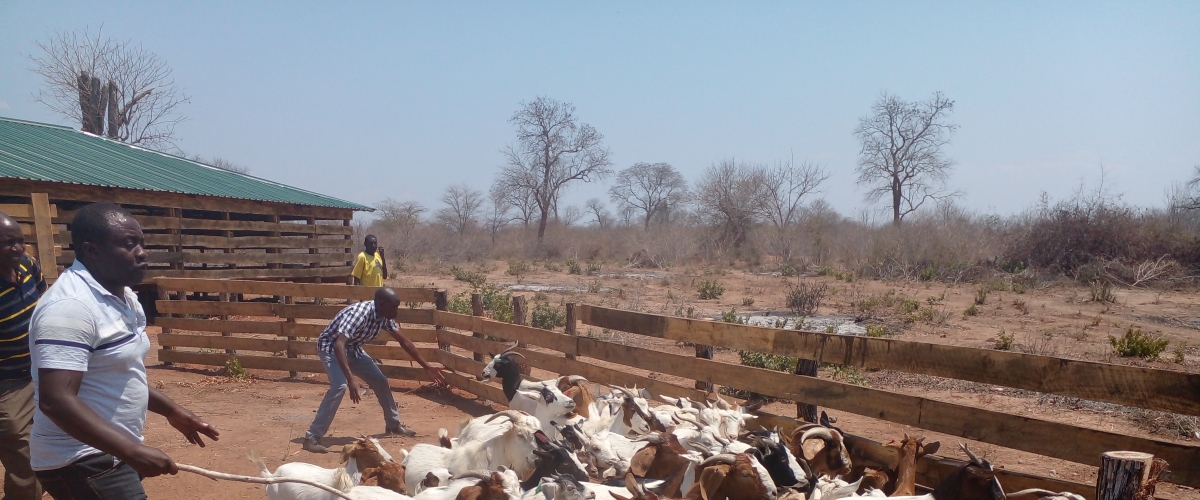
By Happy Mulolani
In the heartland of Zambia, Chirundu's smallholder farmers, primarily engaged in goat rearing, are confronting significant challenges. The absence of high-market-value exotic breeds, an established breeding and marketing center, and effective goat management practices are roadblocks obstructing the path to prosperity. Such problems are often exacerbated by farmers' lack of specialized knowledge and technical proficiency, making it challenging to lure lucrative markets with premium produce.
These persistent issues beckon for strategic interventions, designed to equip farmers with structured, in-depth knowledge about the specific value chains they are interested in. In response, the Enhanced Smallholder Agribusiness Promotion Programme (E-SAPP) has stepped up, with funding from International Fund for Agricultural Development (IFAF) and the Zambian Government. The collaborative endeavor aims to transform the Chirundu livestock farming landscape, especially in goat rearing.
The program started offering its support in 2020 through Farming As A Business Schools (FaaBS). These farmer-centric educational platforms deliver structured lessons on selected commodities, guided by field experts. The intention is to embed knowledge in farmers through a season-long, experiential learning approach, empowering them to evolve and excel in their chosen value chains. This educational journey culminates in an evaluation leading to a matching grant to bolster and expand their value chain operations.
One successful offshoot of this approach is the Mwazoomwa Farming As A Business School, nestled in the Lusitu area of Chirundu district. Mwazoomwa FaaBS focuses on the small livestock value chain, with a specific emphasis on goats. However, acquiring knowledge about sourcing superior breeds and effective management practices to yield high-quality goats capable of penetrating the market was a primary challenge.
Alick Malunga, Chairperson of Mwazoomwa, elaborated that prior practices involved small-scale goat rearing, which resulted in a low market value. "Our local breed's market value ranged between K150-K300, which was not lucrative, primarily due to poor management and the breed itself," he shared.
Driven by their passion for goat rearing and an aim to overcome the hurdles of sourcing exotic breeds and market organization, Mwazoomwa farmers conceived the Goat Breeding Centre. Financed through the Matching Grant Facility (MGF) by E-SAPP, this initiative received an investment of K1.4 million. The funds were utilized for the center's construction, including the manager's house, goat structures, a classroom, and a water tank. This breeding center will supply improved breeds at affordable prices, amplifying the market value and bargaining power of the local farming community.
Mr. Malunga expressed that the farmers have received the Goat Breeding Centre positively. This facility promises an improved breed supply, ultimately enhancing the market value and production of the goats. Moreover, Chirundu District Livestock Officer, Lloyd Mweemba, confirmed that following management training, farmers have started to manage their goats more effectively, leading to higher production and market value.
The initiative has also been endorsed by key figures in the district, including the District Livestock and Fisheries Coordinator, Noah Sinkala, and the Marketing Development Officer, Ernest Koti. They reiterated the benefits of the breeding center and emphasized its role in fostering an entrepreneurship culture and improving livelihoods.
As more farmers begin to rear these superior goats, their collective bargaining power will enhance, leading to higher returns on investment. This unique Goat Breeding Centre initiative could serve as a launchpad for many farmers, yielding increased production, market linkage, and sales. However, to maximize its benefits, there is an evident need for a well-thought-out spillover strategy to extend these positive impacts across other districts.
All these strides and efforts symbolize a promising leap forward in the field of goat farming. With the recent surge in demand for improved breeds, the Goat Breeding Centre represents a promising beacon of hope and prosperity for the hardworking farmers of Zambia.
The author works as a Principal Agricultural Information Officer at the National Agricultural Information Services(NAIS)





